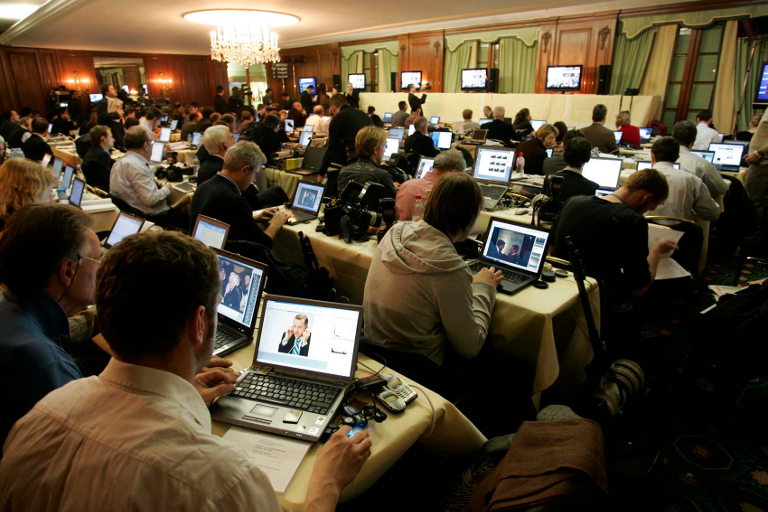The political crisis in America goes deeper than most commentators think. But will they ever see this?
The Republicans’ strong showing in the recent US state and local elections, especially winning the governorship of Virginia, a state Biden won handily last year, has several lessons. One is that Democrats were mistaken in campaigning on anti-Trump sentiments, another that they need to go big and bold.
Even before the elections – less than year into Joe Biden’s presidency, and three years from the next presidential election – some liberal commentators were fretting that Donald Trump might try to steal the 2024 election, or even win it outright. Perhaps liberals never stopped worrying about Trump. He has an extraordinary ability to convince people that everything is about him.
Early this year, as Biden took office, I wrote an essay about how the mainstream liberal media, obsessed with Trump and removing him from office, had missed the opportunity to explore the deeper dynamics behind his shock election. They embraced Biden’s election with sighs of relief over his centrist policies and a return to political normalcy. But nothing had been settled, I warned.
I pitched the essay to about six US media outlets but had, unsurprisingly, no response. So I stripped out much of the material on Trump to focus the paper more broadly on the failure of American mainstream politics and media to reflect and address Americans’ concerns and fears about their lives, their country and their future. I source this failure primarily in their professional cultures. This is, to varying extents, also the predicament of other Western democracies.
My essay draws on several decades of research and analysis of human progress, population health and wellbeing, and the future, so comes from a very different perspective from most political analysis. I argue America’s political and journalistic cultures are too ‘short-sighted’ and ‘narrow-minded’ to address the nation’s challenges and problems. These are ‘existential’ in that they both materially and physically threaten human civilisation and survival, and also undermine people’s sense of confidence and certainty about life.
Political debate needs to encourage the conceptual space for a transformation in our worldview, beliefs and values as profound as any in human history, I say.
I have submitted the revised essay to seven academic journals in the fields of politics, political communication, journalism and the media, and social sciences – again without success. In some cases the issue was a mismatch between my essay and the journal. The editor of one journal wrote: ‘It is a well written and interesting paper, and I enjoyed reading it, and learned from it’. But, he said, it was not a good match for the journal. The reason given in another case was the competition for publication (many leading journals have rejection rates of over 90%).
But there is also the Trump factor. One editor claimed that, ‘the fundamental thesis is that failing to re-elect Trump was a lost opportunity. We feel this analysis does not reflect an understanding of either Trump, the Trump base, or even the Republican Party to have anything to offer in the way of policy recommendations, little except anger, victimization, and hatred of the elites, Republican as well as Democrat’. It is a gross misrepresentation of the essay.
Another editor wrote: ‘Although we do publish some opinion pieces, they are generally not so starkly partisan with respect to the political parties. There is a case to be made that Trump was elected for objective reasons that should not be forgotten, but we really do need to fold opposing viewpoints into a discussion of this kind. It is doubtful that the political reality is as one sided as you portray it.’
I appealed – unsuccessfully – against the latter decision, pointing out Trump was the focus of only one of six sections of the essay; it was ‘pro-Trump’ only to the extent of acknowledging his political impact; and it transcended party politics. ‘My central thesis is that the cultures of politics and journalism are too constrained and outdated to respond adequately to people’s deep concerns about life and the future, and to the magnitude of the challenges facing the US and the world. I used Trump’s election and the liberal media’s reaction to him to illustrate this “cultural blindness”.’
However, I lay awake one night thinking about the editor’s criticism, and decided that he was right: although my critique was of mainstream political orthodoxy, I realised many readers would see it as a partisan attack on the Democrats and the liberal media.
So I will revise the essay again and submit it to yet another journal: take out more of the Trump material, and make it even clearer that the essay’s core argument is that the political systems of Western liberal democracy are failing. Blinkered by their cultures, most politicians and journalists do not see the extent of this failure.
This should be the most fundamental layer of political discourse – one which remains largely missing.
[A ‘preprint’ of the full essay is available here.]
Teaser photo credit: Journalists at a press conference. By Kai Mörk, CC BY 3.0 de, https://commons.wikimedia.org/w/index.php?curid=6438250





